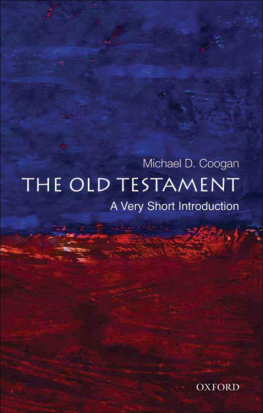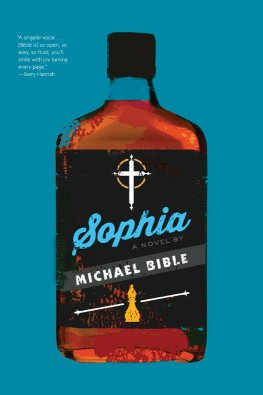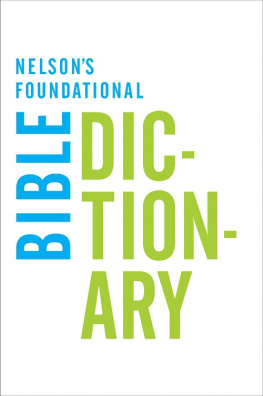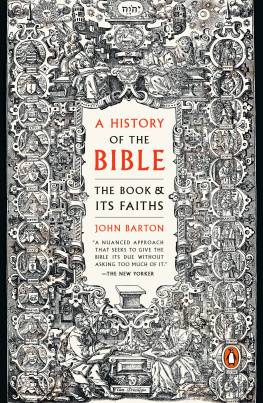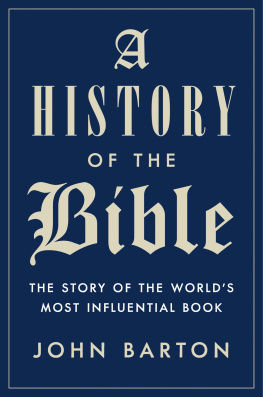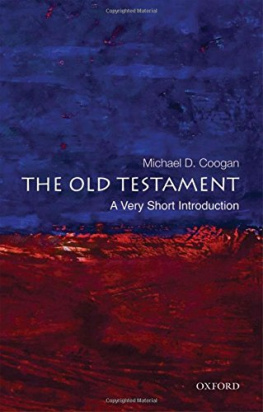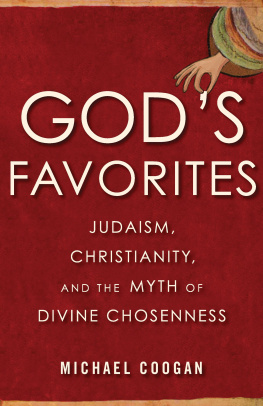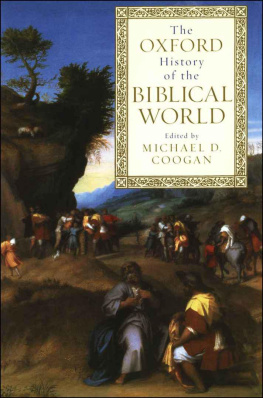THE BIBLE
WHAT EVERYONE NEEDS TO KNOW
THE BIBLE
WHAT EVERYONE NEEDS TO KNOW
MICHAEL COOGAN


Oxford University Press is a department of the University of Oxford. It furthers the Universitys objective of excellence in research, scholarship, and education by publishing worldwide. Oxford is a registered trade mark of Oxford University Press in the UK and certain other countries.
What Everyone Needs to Know is a registered trademark of
Oxford University Press.
Published in the United States of America by Oxford University Press
198 Madison Avenue, New York, NY 10016, United States of America.
Oxford University Press 2021
All rights reserved. No part of this publication may be reproduced, stored in a retrieval system, or transmitted, in any form or by any means, without the prior permission in writing of Oxford University Press, or as expressly permitted by law, by license, or under terms agreed with the appropriate reproduction rights organization. Inquiries concerning reproduction outside the scope of the above should be sent to the Rights Department, Oxford University Press, at the address above.
You must not circulate this work in any other form and you must impose this same condition on any acquirer.
Library of Congress Cataloging-in-Publication Data
Names: Coogan, Michael David, author.
Title: The Bible : what everyone needs to know / Michael Coogan.
Description: New York, NY, United States of America :
Oxford University Press, 2021. | Includes bibliographical references and index.
Identifiers: LCCN 2020012864 (print) | LCCN 2020012865 (ebook) |
ISBN 9780199383047 (hardback) | ISBN 9780199383030 (paperback) |
ISBN 9780199383061 (epub)
Subjects: LCSH: BibleIntroductions.
Classification: LCC BS475.3 .C664 2020 (print) |
LCC BS475.3 (ebook) | DDC 220.6/1dc23
LC record available at https://lccn.loc.gov/2020012864
LC ebook record available at https://lccn.loc.gov/2020012865
For Pam, as always
Contents
| BCE | Before the Common Era (the equivalent of BC) |
| CE | Common Era (the equivalent of AD) |
| CEB | Common English Bible |
| ch(s). | chapter(s) |
| EBR | Encyclopedia of the Bible and Its Reception |
| GNB | Good News Bible |
| KJV | King James Version (Authorized Version) |
| LXX | The Septuagint |
| MT | The Masoretic Text |
| NAB | New American Bible |
| NABRE | New American Bible, Revised Edition |
| NIV | New International Version |
| NJPS | New Jewish Publication Society Translation |
| NRSV | New Revised Standard Version |
| par. | parallel passages in the Synoptic Gospels |
| RSV | Revised Standard Version |
I have used a simplified transliteration system for Hebrew, Aramaic, and Greek that will be transparent to those familiar with the languages.
The Bible is the sacred scripture of Judaism and Christianity. In its pages we encounter some of the most memorable characters in world literature: Adam and Eve, Cain and Abel, Abraham and Sarah, Jacob, Moses, Samson and Delilah, David and Bathsheba, Job, Jesus, and Paul; some of the best-known religious texts: the Ten Commandments, the Shema, Psalm 23, and the Sermon on the Mount; and some of the most important concepts in theology: covenant, chosenness, sin, atonement, and salvation. Over the ages, the Bible has also had an enormous influence on politics, on literature and the arts, and even on medicine and science.
The word Bible basically means book.many complexities, both because of the Bibles long history of formation and because of the different faith communities that consider it canonical.
The technical term for authoritative scripture is canon, a word that comes from the Greek word for the cane plant, whose reeds were used as measuring sticks. A canon is thus originally a ruler and thus in effect a rule.
In the study of literature, a canon is a group of texts that have a special status, that are classics, as it were. In the study of religion, a canon is those sacred texts that have special authority for a community. A canon may be a group of texts whose components are not necessarily fixed, as in Hinduism and Buddhism, or, more narrowly, only those texts that religious authorities have recognized as authoritative sacred scripture, in other words as canonical.
But the Bible is not just one canon, but several, that to some extent overlap. The processes that led to the formation of the several biblical canons were complex and gradual, and are not fully documented. Although the basic shape of the Jewish canon was set by the second century CE, there continued to be debates around the edges about whether some books should be dropped or others added.
The same is true for the New Testament. The canonical status of a few of its books was debated, and other books that some groups considered canonical were eventually not included in it. By the late fourth century, a canon of forty-six books in the Old Testament and twenty-seven in the New Testament was the norm in western Christianity, while several eastern churches added one or more books to each.
The term Bible, then, means different things to different religious communities. All of this is very complicated, but it is necessary to explain, because, among other reasons, it shows that the Bible is a human creation: the books that comprise it, and the order in which they occur, were not sent down from heaven.
In Jewish tradition, the Bible has twenty-four separate books, divided into three major parts..)
Table 1.1 Tanak(h) (The Jewish Bible)
| Torah |
| Genesis |
| Exodus |
| Leviticus |
| Numbers |
| Deuteronomy |
| Neviim (The Prophets) |
| The Former Prophets |
| Joshua |
| Judges |
| 12 Samuel |
| 12 Kings |
| The Latter Prophets |
| Isaiah |
| Jeremiah |
| Ezekiel |
| the book of the twelve |
| Hosea |
| Joel |
| Amos |
| Obadiah |
| Jonah |
| Micah |
| Nahum |
| Habakkuk |
| Zephaniah |
| Haggai |
| Zechariah |
| Malachi |
| Ketuvim (The Writings) |
| Psalms |
| Proverbs |
| Job |
| The Five Scrolls |
| The Song of Songs |
| Ruth |
| Lamentations |
| Ecclesiastes |
| Esther |
| Daniel |
| Ezra-Nehemiah |
| 12 Chronicles |
Of these three parts, the Torah was the first to be considered authoritative scripture. By the fifth century BCE, if not before, that teaching or law was in written form and was ascribed to Moses.considerably. There is even more variation in the order of the books in the Writings, which was the last part of the canon to be considered authoritative scripture.


